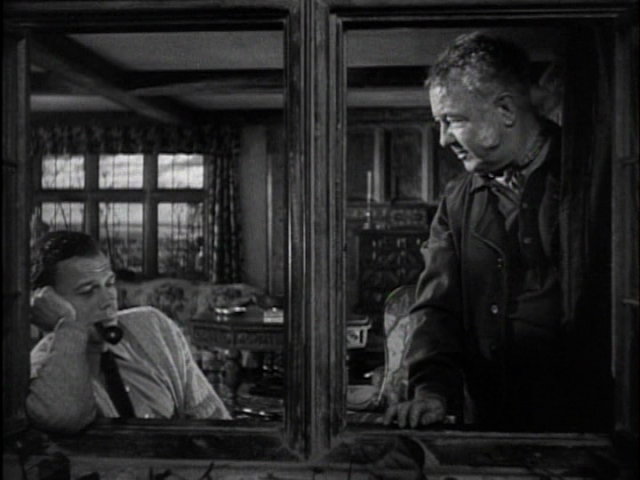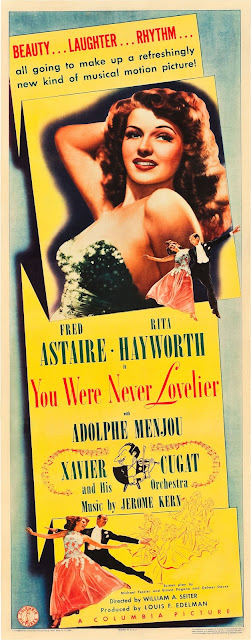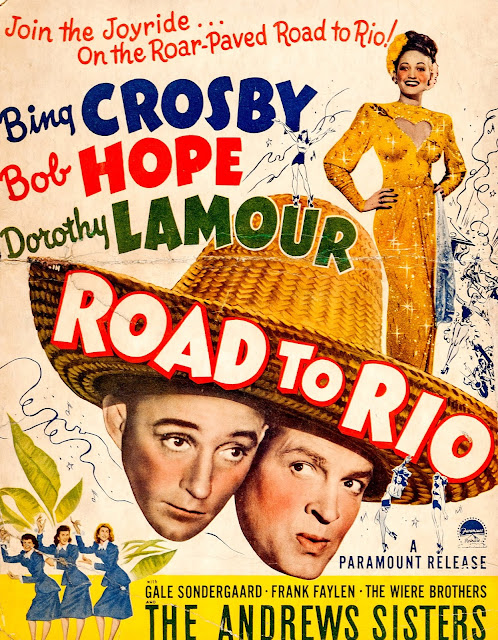Love Letters (1945): Turmoil, Tragedy, and True Love
There are few films that touch me as deeply as Love Letters. For many people, Portrait of Jennie, another drama starring Jennifer Jones and Joseph Cotten, is the more beloved film. However, as much as I was moved by Portrait of Jennie's ghostly romance, Love Letters, ironically, was the one that haunted me. Its delicate story is at turns mysterious, heartbreaking, sweet, and, ultimately, lovely.
The plot is anything but simple, and I hesitate to say too much for anyone who hasn't seen the film yet. Cotten plays Alan, a soldier who has been writing letters to fellow soldier Roger's sweetheart, Victoria, on Roger's behalf. Alan is overcome with guilt about the arrangement, though, because it is clear to him that Victoria has treasured these letters and has fallen for Roger as a result of them, despite Roger's real-life indifference to her. Soon enough, Alan learns that Roger and Victoria were married. For months, Alan can think of nothing but the girl he wrote to. When he hears that Roger and Victoria are both dead, he can't help but feel that he played some part in it.
And then, one day, Alan meets Jennifer Jones's Singleton, a strange girl who feels drawn to him. Realizing that it'll be impossible to keep Alan and Singleton away from one another, Singleton's best friend Dilly (a great Ann Richards) admits the truth to him: Singleton is actually an amnesic Victoria, the devastating result from one horrific night when Dilly discovered Roger dead and a catatonic Victoria next to him with blood on her dress, a knife in her hand, her cherished letters burning in the fireplace, and her memory gone. Fearful that the truth of Singleton's past will further damage her mind, Alan keeps her identity a secret from her, which becomes more and more difficult as they fall deeper in love.
The plot is anything but simple, and I hesitate to say too much for anyone who hasn't seen the film yet. Cotten plays Alan, a soldier who has been writing letters to fellow soldier Roger's sweetheart, Victoria, on Roger's behalf. Alan is overcome with guilt about the arrangement, though, because it is clear to him that Victoria has treasured these letters and has fallen for Roger as a result of them, despite Roger's real-life indifference to her. Soon enough, Alan learns that Roger and Victoria were married. For months, Alan can think of nothing but the girl he wrote to. When he hears that Roger and Victoria are both dead, he can't help but feel that he played some part in it.
And then, one day, Alan meets Jennifer Jones's Singleton, a strange girl who feels drawn to him. Realizing that it'll be impossible to keep Alan and Singleton away from one another, Singleton's best friend Dilly (a great Ann Richards) admits the truth to him: Singleton is actually an amnesic Victoria, the devastating result from one horrific night when Dilly discovered Roger dead and a catatonic Victoria next to him with blood on her dress, a knife in her hand, her cherished letters burning in the fireplace, and her memory gone. Fearful that the truth of Singleton's past will further damage her mind, Alan keeps her identity a secret from her, which becomes more and more difficult as they fall deeper in love.
Cotten and Jones exquisitely illustrate their characters' pain and loss as Alan and Singleton struggle to find their way to one another. Both characters are like open wounds, thrown into a world that doesn't fully understand them. Alan's friends and family glorify his time in the war, which makes him uneasy and leads to a disconnect as Alan finds he is no longer the person he used to be. Singleton, on the other hand, doesn't know who she used to be, a situation that proves simultaneously freeing and terrifying. As she says to Alan, "I've forgotten and you don't want to remember, that's the only difference between us."
Troubled by their past and unsure of their future, the only thing the couple can trust is their feelings for one another, feelings that not even WWII or amnesia could stop. For Alan and Singleton, every second they spend together is precious. Whenever one of her clouded memories suddenly intrudes, you ache right alongside them as they fight and claw their way back to their fleeting moments of happiness.
Jennifer Jones was a bewitching presence. Her performance as Singleton is simply intoxicating. It would be understandable if her character's mental state left her immobilized, afraid to experience life after being dealt such a cruel hand. But Singleton finds joy in everything and never feels the need to hold anything back. She fiercely refuses to let her victimization define her, instead choosing to embrace her vibrant, optimistic personality. Jones often complicated her highly sensuous image by leaning into her immense vulnerability and exploring wounded, complex women. There was a purity about her that she infused into her roles, but she also made you realize that you shouldn't mistake purity for naivety or stupidity.
I always think of strength when I think of Joseph Cotten. With his height and frame and that terrific, deep voice, he just looked and sounded like someone who could be imposing. Cotten didn't rely on that, though. He seemed to have no problem tapping into his soft side and he gave his "weaker" characters dignity and intense humanity. The sheer effortlessness and naturalness of his performances may be why he isn't as well-remembered today, but Love Letters is a marvelous example of why Cotten deserves to be rediscovered. The tenderness and sensitivity he gives the material is exactly what the film needs, as is the chemistry he shares with Jones. There is something otherworldly about these two. It's almost indescribable how perfectly they fit together.
Love Letters is not a film that is easy to forget, and it is not just because of the powerful performances (including Gladys Cooper's brilliant turn as Singleton's embittered guardian). William Dieterle's direction, for example, is incomparable. The images he brings us are gorgeously dreamy, thanks in part to Lee Garmes's swooning cinematography. Ayn Rand's script may stretch credibility, but when you're watching something as profound as two lost souls finding one another amongst violence and grief, you won't even care.
"I think very few people are happy," Singleton remarks at one point. "They wait all their lives for something to happen to them -- something great and wonderful. They don't know what it is but they wait for it. Sometimes it never happens. What they want is the kind of spirit I found in those letters. A spirit that makes life beautiful." Believe me when I say Love Letters is such a spirit.
Love Letters is not a film that is easy to forget, and it is not just because of the powerful performances (including Gladys Cooper's brilliant turn as Singleton's embittered guardian). William Dieterle's direction, for example, is incomparable. The images he brings us are gorgeously dreamy, thanks in part to Lee Garmes's swooning cinematography. Ayn Rand's script may stretch credibility, but when you're watching something as profound as two lost souls finding one another amongst violence and grief, you won't even care.
"I think very few people are happy," Singleton remarks at one point. "They wait all their lives for something to happen to them -- something great and wonderful. They don't know what it is but they wait for it. Sometimes it never happens. What they want is the kind of spirit I found in those letters. A spirit that makes life beautiful." Believe me when I say Love Letters is such a spirit.
I'm happy to say this is my contribution to the Joseph Cotten Blogathon, hosted by In the Good Old Days of Classic Hollywood and Maddy Loves Her Classic Films. Do check out the other tributes to this remarkable actor by clicking here.







































































What a lovely review of a lovely film. You captured the essence of what makes this film so moving and memorable, even after all these years.
ReplyDeleteThank you, Brittaney! It means a lot to me that you thought I did this tremendous film even the tiniest bit of justice.
DeleteFantastic review, and I love your screencaps! I know I mentioned that Love Letters is my favorite Joseph Cotten movie, but I've still only seen it once and your write-up makes me want to see it again!
ReplyDeleteThank you! Even when I had only seen the film once, I knew it was an instant favorite. It's just a very special film. And it was hard not to go totally overboard with the screencaps. Jennifer Jones was undoubtedly one of the most gorgeous women in Hollywood.
DeleteBeautiful review. I want to see this one so much. Just as you are not sure you could handle I'll Be Seeing You, I am sure that Love Letters will leave me sobbing. Thanks so much for joining us to celebrate Joseph with this terrific article.
ReplyDeleteThanks, Maddy! Joseph Cotten really cornered the market on sensitive romantic dramas, didn't he?
DeleteI just watched the movie and it was everything you described so beautifully! Thank you for sharing.
ReplyDelete